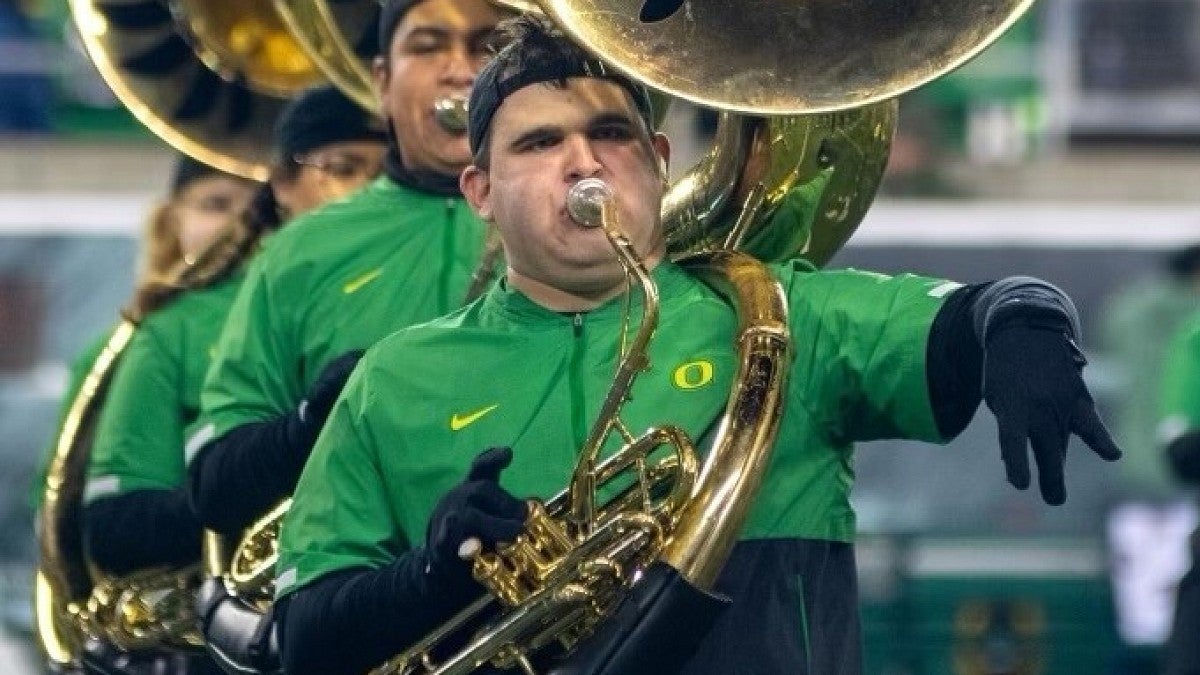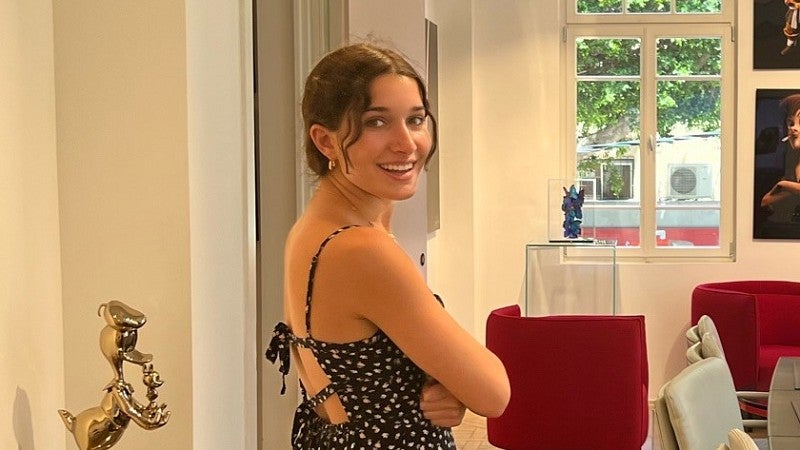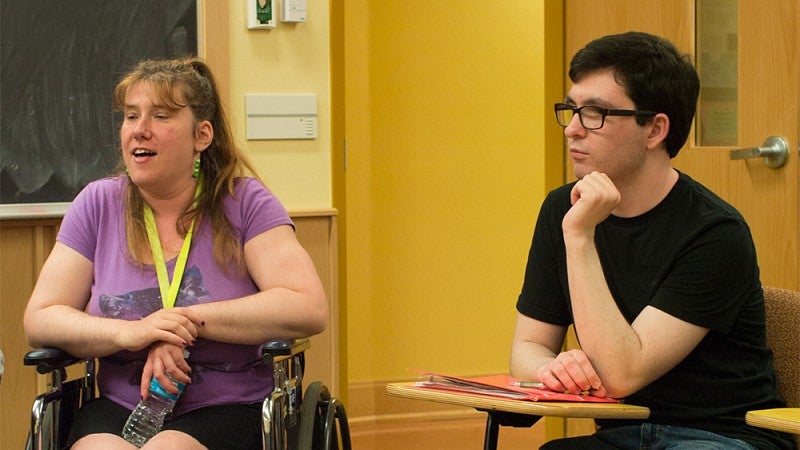
Experiential Learning | Research & Innovation | Community Impact | Career Preparation | Teaching Excellence | 21st Century Liberal Arts | Building Community | Good Vibes | CAS Spotlights | All Stories | Past Issues

September 27, 2024
Exploring Identity in CAS
Discovering a part of yourself through education can be life changing.
Imagine enrolling in a disability studies course to fulfill a requirement, only to realize you have a disability. Or choosing a gender studies class that unexpectedly shapes your career path. Perhaps a course on ethnic identity deepens your connection to your family.
These powerful transformations often happen when students take classes that resonate with their identities.
University of Oregon’s College of Arts and Sciences (CAS) provides students across campus an opportunity to explore their identities through its wide-ranging core education offerings and 50-plus degree programs. These programs help support the college's strategic goal of ensuring every member of the CAS community—especially those from traditionally underrepresented populations—feels connected, valued and supported in their scholarly and professional pursuits.
Entry-level courses focused on identities—such as disabilities, religion, ethnicity and gender—often fall into the electives category. These classes provide students with an opportunity to reflect on their personal experiences, challenge societal norms and develop a deeper understanding of themselves and others.
"Being Jewish has always been a central part of my identity and my faith,” says fourth-year student Talia James, who is pursuing a major in public relations and a minor in Judaic studies. “I always felt connected to the Judaic studies curriculum, professors and other students; the courses unraveled a new layer of my identity and Jewish American history. The Judaic studies department inspired me to travel and work in Israel and get more involved with my community on campus.”
James’ honors thesis will explore the historical background of global antisemitism, focusing on creating a guidebook to help educators incorporate and improve the study of antisemitism in higher education and DEI training.
Like James, who was able to turn her passion for Judaic studies into something with academic potential, Brian Trapp’s personal experience shaped his academic and career journey.
Trapp, senior instructor and director of disability studies in CAS, grew up with a twin brother who had cerebral palsy and intellectual disabilities. While he explored the topic as well as he could through his undergraduate degree, it was in graduate school that he was able to fully focus on the subject.
“I was looking for fields of study that helped me understand my experience with my brother,” Trapp says. "It gave me the tools to think, 'OK, this is not just my family. This is an entire human experience.’”

Advocating for every human
From his own personal experiences with a disability, Colin Wilfrid knew he wanted to attend a university with a good disability rights program. That, plus his desire to join a great marching band, influenced his decision to attend UO.
“While I was already good at speaking from my own experience when advocating for neurodivergent rights since I have autism, in disability studies courses I learned that I needed to advocate on behalf of people with physical disabilities as well,” says Wilfrid, who graduated in 2024 with a major in political science and a minor in disability studies.
“People who are neurodivergent helping people with physical disabilities makes a lot of sense," Wilfrid adds, "because we experience access and inclusion barriers too, in ways that get in the way of our learning instead of in the way of our mobility.”
Neurodivergence refers to a difference in brain function from what is considered typical, such autism or attention deficit/hyperactivity disorder (ADHD).
Disability studies also can have a significant impact on students without disabilities, particularly those in helping professions like special education, speech and language pathology, or pre-med. These students often enter the field with a desire to help, but without a deep understanding of the complexities of disability.
Through their studies, they learn to question their preconceived notions and what the actual wants and needs are of the community. They all learn from each other.
This exchange of perspectives not only makes these students better caregivers, therapists, and doctors but also challenges the boundaries they've constructed between "normal" and "abnormal."
In addition to his classes, Wilfrid served on the leadership team for AccessAbility Student Union, UO’s disability rights advocacy organization, where he befriended other students in disability studies.
“I also took a class called Story Circle Theater, where we put on a play based on the stories of disability experience,” says Wilfrid. “I do not know if I would have had the courage to embrace my autism and advocate for disability rights whenever I can had it not been for becoming a member of the disability studies minor.”

Learning through intersectionality
Exploring identity requires an understanding of intersectionality—the overlapping of categories such as race, gender, class, sexuality, immigration status, religion and ability —and how all identities play a role in how we establish our own identity.
“Our students are full humans and carry all these identities with them in their exploration of curriculum,” says Kristin Yarris, associate professor and head of the Department of Women’s, Gender and Sexuality Studies. “In these courses we help students move beyond their complex lived experience into understanding social and historical structures and processes that produce these identities."
Yarris points out that such studies also prepare students for the world beyond academia by fostering critical thinking, cross-cultural understanding, an understanding of diverse experiences and perspectives, and the ability to articulate one’s place in the world.
For students interested in exploring their identity, challenging societal assumptions or simply understanding the human experience more deeply, identity-focused studies offer a rich and rewarding path.
"Just take a class. Trying it out and seeing if it sparks your interest could show you how to be empowered by your identity,” Trapp says. “And no matter what, these liberal arts courses train you to be a deeper human being. They train you to be a citizen, not just an employee. You can take that intrinsic motivation to any career you pursue.”
—By Jenny Brooks, College of Arts and Sciences
Identity-Focused Coursework
The College of Arts and Sciences offers an extensive range of options for students interested in exploring courses related to their interests, culture, ethnicity and other forms of identity. These programs help create a culture where every member of the CAS community feels connected and supported. Many of the courses offered in these departments qualify for core education credits and can be starting points for a major or minor.
